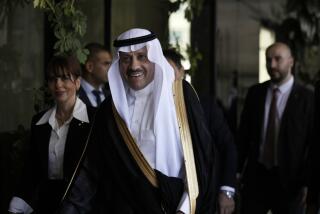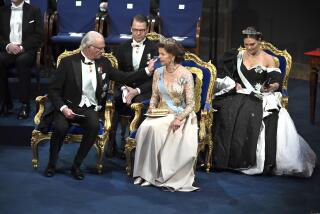Crown Prince Nayif ibn Abdulaziz dies at 78; head of Saudi Arabia’s Interior Ministry
CAIRO — Crown Prince Nayif ibn Abdulaziz, head of Saudi Arabia’s feared Interior Ministry who after a series of attacks inside the kingdom became a close Washington ally against Al Qaeda, died Saturday, months after he was named heir apparent in the world’s leading oil power.
Nayif, 78, had long been ailing and his death spurred another royal family jostle for a successor to King Abdullah, who is in his late 80s. Nayif was an authoritarian who backed the country’s puritanical Wahabi clerics and cracked down on political dissent, especially over the last year as rumblings of Arab uprisings reached the desert monarchy.
He was often at odds with the modest social and political reforms championed by the king. In many ways, Nayif epitomized the Saudi state — loyal, if opportunistic, toward its international friends and ruthless to challengers, whether they be terrorists operating in neighboring Yemen or activists and lawyers protesting against discrimination inside the kingdom.
A statement by the royal family said Nayif died abroad. When Nayif left the kingdom in May, a government statement said he would undergo medical tests while on a “personal vacation” in Geneva. His ailment was not disclosed.
The death opens the possibility that a younger generation within the House of Saud, as the royal family is known, might edge closer to the throne, eventually replacing figures who have amassed billions of dollars and run the country for decades. One of the top contenders for heir, however, is Nayif’s brother, Prince Salman, the 77-year-old hard-line defense minister and former governor of Riyadh, the Saudi capital.
“Saudi Arabia will have to decide if this is the time to set the next generation on the path to rule,” Simon Henderson, a Saudi expert at the Washington Institute for Near East Policy, told the Associated Press.
Nayif was the second crown prince to die in the past year. Prince Sultan, who had been ill for years, died in October.
In Washington, President Obama credited Nayif with helping the U.S. and Saudi Arabia to develop “a strong and effective partnership in the fight against terrorism, one that has saved countless American and Saudi lives.” The statement from the White House added: “Crown Prince Nayif also strongly supported the broader partnership between our two countries begun by his late father, King Abdul Aziz al-Saud, and President Roosevelt in their historic meeting in 1945.”
That connection with Washington — from the early days of oil exploration to the later battle against terrorism — has been based more on strategic alliance than friendship. The two countries are close, but American officials criticized the Saudis after Sept. 11, 2001, for perpetuating an extremist strand of Islam that often inspired terrorism. Nayif originally claimed that 9/11 was a Jewish conspiracy, but that sentiment changed two years later when Al Qaeda began attacking inside the kingdom.
The U.S. also criticized Saudi Arabia’s arrests and imprisonment of opposition figures, a policy articulated by Nayif.
A son of the kingdom’s founder, King Abdul Aziz al-Saud, and a half-brother of King Abdullah, Nayif had been Interior Minister since the mid-1970s. In that position, Nayif was close to the country’s clerics and supported their influence over laws and the much-despised religious police. The crown prince opposed most attempts to open up Saudi society, including a proposal for the kingdom to permit women to drive and other issues that often ran against reforms pushed by Abdullah.
In its 2012 World Report, Human Rights Watch blamed Saudi Arabia for using “unflinching repression” in “redoubling its efforts to punish those who dare to demand democracy and human rights reform.”
Mohammad Fahad Al-Qahtani, an activist and frequent critic of Nayif’s Interior Ministry, told The Times in April that the royal family was under increasing pressure from the revolts sweeping the Middle East and North Africa. Nayif’s forces moved quickly last year to put down protests in the country’s east after uprisings in neighboring Bahrain.
“They can’t buy their way out anymore, and they’re not willing to compromise,” said Al-Qahtani, an economics professor and president of the Saudi Civil and Political Rights Assn. “The problem is an aging leadership and a second generation that’s really corrupt. The near future of this country is gloomy.”
More to Read
Start your day right
Sign up for Essential California for news, features and recommendations from the L.A. Times and beyond in your inbox six days a week.
You may occasionally receive promotional content from the Los Angeles Times.







